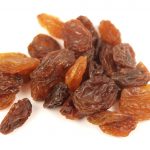 Currants are small, round berries that are dried and used in jellies and pastries. Their name is not related to the word current as in current affairs—a word that derives from the Latin currere, meaning to run—but rather derives from Corinth, the name of a city in Greece. In ancient times, Corinth exported dried grapes to the rest of Europe, grapes that in France acquired the name raisins de Corinthe. In the early fourteenth century, this phrase was adopted into English as raisins of Corauntz, which by the early sixteenth century had shortened to just corauntz. This form of the name was then mistaken for a plural, causing people to assume that a single one of these dried grapes was a coraunt, a word later respelt as currant. Finally, in the last half of the sixteenth century, the word currant was applied by the English to a shrub—introduced to their island from the continent—that they falsely believed to be the source of the Greek currants. These berries, which are actually related to the gooseberry, were called bastard currants by those who realized that they were in no way related to real currants, but in time they too became known just as currants, or sometimes as red currants and black currants. Incidentally, the city of Corinth—or as the Greeks call it, Korinthos—takes its name from a Pelasgian word, kar, meaning point, an allusion to Corinth’s location on the tip of an isthmus.
Currants are small, round berries that are dried and used in jellies and pastries. Their name is not related to the word current as in current affairs—a word that derives from the Latin currere, meaning to run—but rather derives from Corinth, the name of a city in Greece. In ancient times, Corinth exported dried grapes to the rest of Europe, grapes that in France acquired the name raisins de Corinthe. In the early fourteenth century, this phrase was adopted into English as raisins of Corauntz, which by the early sixteenth century had shortened to just corauntz. This form of the name was then mistaken for a plural, causing people to assume that a single one of these dried grapes was a coraunt, a word later respelt as currant. Finally, in the last half of the sixteenth century, the word currant was applied by the English to a shrub—introduced to their island from the continent—that they falsely believed to be the source of the Greek currants. These berries, which are actually related to the gooseberry, were called bastard currants by those who realized that they were in no way related to real currants, but in time they too became known just as currants, or sometimes as red currants and black currants. Incidentally, the city of Corinth—or as the Greeks call it, Korinthos—takes its name from a Pelasgian word, kar, meaning point, an allusion to Corinth’s location on the tip of an isthmus.
The diminutive, desiccated, and barren grape, which derives its nomenclature from the city of Corinth in Greece, where it was first distributed.
This designation pertains to the desiccated produce and also to a cluster of newly harvested fruits identified as black, vermilion, and ivory-colored currants.
